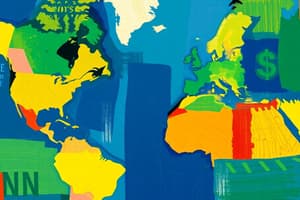Podcast
Questions and Answers
What role does the international monetary system play in foreign-exchange markets?
What role does the international monetary system play in foreign-exchange markets?
- Promoting isolationism
- Discouraging international trade
- Encouraging nations to adopt fixed exchange rates
- Encouraging the elimination of balance-of-payments problems (correct)
Why did the debates over British trade policy in the early 19th century significantly impact the field of economics?
Why did the debates over British trade policy in the early 19th century significantly impact the field of economics?
- They resulted in the dissolution of the International Monetary Fund (IMF)
- They converted economics from a discursive, informal field to a model-oriented subject (correct)
- They had no impact on the field of economics
- They led to the formation of the World Trade Organization (WTO)
How does the global economy benefit from the linkages created through trade in goods and services?
How does the global economy benefit from the linkages created through trade in goods and services?
- By reducing economic interdependence
- By promoting economic isolationism
- By creating a turbulent place for policy makers and business leaders
- By allowing countries to exploit gains from trade and foreign lending efficiently (correct)
What is one of the functions provided by the international monetary system in the event of economic shocks?
What is one of the functions provided by the international monetary system in the event of economic shocks?
In maintaining fixed exchange rates with respect to the dollar, which entity was given this task by nations?
In maintaining fixed exchange rates with respect to the dollar, which entity was given this task by nations?
How has the field of economics evolved over time due to British trade policy debates in the early 19th century?
How has the field of economics evolved over time due to British trade policy debates in the early 19th century?
What impact do linkages through trade in goods and services have on the global economy?
What impact do linkages through trade in goods and services have on the global economy?
What does the international monetary system facilitate in terms of foreign-exchange markets?
What does the international monetary system facilitate in terms of foreign-exchange markets?
What is one of the functions of central banks with respect to maintaining fixed exchange rates?
What is one of the functions of central banks with respect to maintaining fixed exchange rates?
Why is it challenging for nations to exploit gains from trade without an adequately functioning international monetary mechanism?
Why is it challenging for nations to exploit gains from trade without an adequately functioning international monetary mechanism?
Flashcards are hidden until you start studying
Study Notes
International Monetary System
- Before World War I, currencies were fixed in terms of gold, and after World War II, they were fixed in terms of the US dollar.
International Policy Coordination
- The international economy consists of sovereign nations, each with its own economic policies, which can affect other countries.
- Differences in goals among countries can lead to conflicts of interest, and coordination of policies is crucial to achieve harmony.
International Capital Market
- The International Capital Market is a system for buying and selling securities across borders, allowing nations to borrow and invest globally.
- Government policies toward international trade are often determined by the relative power of different interest groups within countries.
Balance of Payments
- The balance of payments (BOP) is a country's financial report card, tracking its international transactions over time.
- BOP consists of three main components: current, capital, and financial accounts, and an additional component, Gross Capital Flow.
- Understanding the BOP requires an economic analysis of its context, including foreign direct investment by multinational corporations.
Exchange Rate Determination
- Exchange rate is the ratio at which one currency is converted into another currency.
- Historically, exchange rates were fixed by government action, but now they are determined in the marketplace.
- Central banks were responsible for maintaining fixed exchange rates with respect to the dollar for each currency.
Historical Background
- David Hume's essay "Of the Balance of Trade" (1758) is considered the first economic model.
- The debates over British trade policy in the early 19th century contributed to the development of economics as a model-oriented subject.
- In the early 21st century, nations are more closely linked than ever before through trade, flows of money, and investment in each other's economies.
Importance of International Monetary System
- The international monetary system binds national economies together, providing order and stability to foreign-exchange markets.
- It encourages the elimination of balance-of-payments problems and provides access to international credits in the event of shocks.
- An adequately functioning international monetary mechanism is necessary for nations to efficiently exploit the gains from trade and foreign lending.
Studying That Suits You
Use AI to generate personalized quizzes and flashcards to suit your learning preferences.



